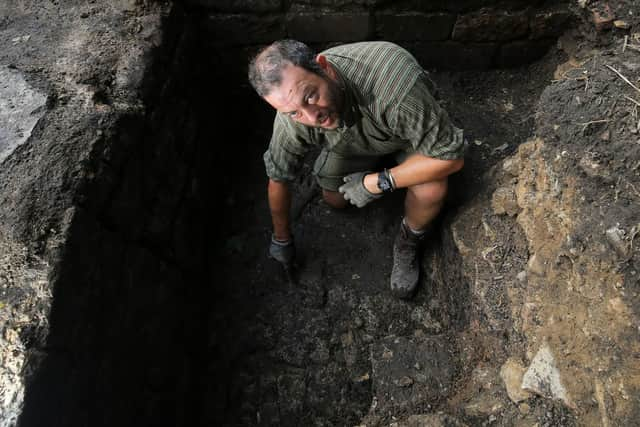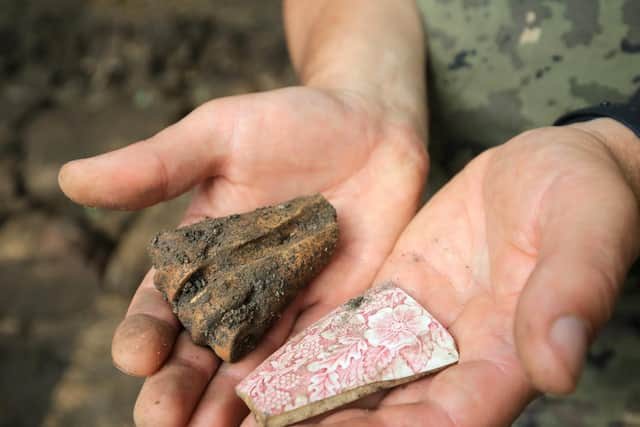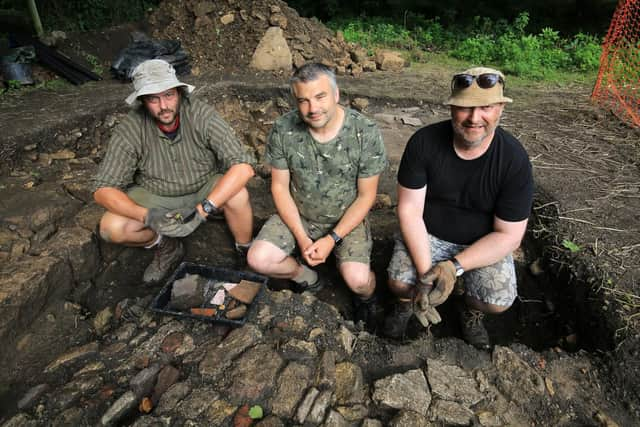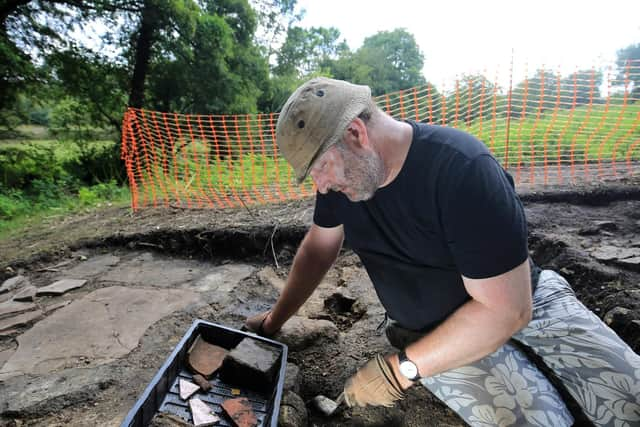How 12th Century priory project near Yorkshire village is giving volunteers new future


As Andrew Parker steps out of the trench he has been excavating on the site of a 12th Century priory which once stood on the outskirts of the South Yorkshire village of Hampole over the course of a fortnight, he reflects on how close he came to not being involved at all.
The 40-year-old from Cudworth near Barnsley, who has been on long-term sick leave with mental health issues for several years, was travelling by public transport to the site of the heritage project organised by charity Soldier On! when he had a panic attack on the train. But rather than giving up on being involved, he let the charity’s team know and they arranged for him to be given lifts from his house to the site near Doncaster.


Advertisement
Hide AdAdvertisement
Hide AdBy the time The Yorkshire Post meets him on one of the final days of the two-week project which he heard about through Facebook, Parker says he is a changed man. “People have said ‘you are a totally different person to the one who started’ and I feel it,” he says.
Parker did a degree in archeology but has never worked in the field, instead doing a variety of jobs including on building sites. He was employed by home improvement store Wickes when he had a breakdown four years ago and hasn’t worked since. “Things came to a head and I was having panic attacks and tried self-harming. I ended up on medication and being signed off from work. I went into myself. But coming up here, my confidence is building again.”
He says being involved in the project has had a transformative effect, growing his confidence to the extent of being able to give an interview to BBC Look North about the scheme. “I would have never had the confidence to do that before I started,” he says. “My girlfriend has said, ‘The Andy I know is back’. She has helped me all the way through. Everyone in the family is pleased. I’m not a very expressive person but I have really enjoyed it.


Advertisement
Hide AdAdvertisement
Hide Ad“I am hoping now to get back into work but to get back doing something I enjoy rather than just anything. I want to go into something related to archeology. I will certainly come back with Soldier On.”
For the charity’s founding trustee Nicholas Harrison, Parker’s experiences are a perfect illustration of what Soldier On hopes to achieve for the volunteers who have been participating in the work at the Hampole Priory site.
The organisation was founded back in 2008, initially with a focus on helping military veterans who were struggling to adjust to civilian life and hold down a job through personal development programmes. But since the start of last year, it has expanded its reach to offer support to anyone in need of help, as well as running archaeology fieldwork projects.
Harrison explains: “I had a background in recruitment and wanted to set up an organisation that would provide a more bespoke career transition to people who had been medically discharged from the Armed Forces. I had seen too many individuals being offered a generic approach to finding a job. If they found a job it was often just ‘any job’ and possibly not the right job for them. The most fundamental thing the charity does is teach people they can be the architects of their own futures.


Advertisement
Hide AdAdvertisement
Hide Ad"The problems for veterans are the same as for anybody who is struggling to find work, is socially isolated or suffering from health problems. It is for that reason that Soldier On has opened its doors to anybody who needs us, civilian or otherwise. We are building community cohesion and breaking down social barriers. We had someone here last week who said she had grown up in a fairly anti-military family and had never come across members of the armed forces. She said the project has allowed her to realise they are just like her.”
The charity has helped hundreds of people, with service users going on to find jobs with the likes of Castle Howard, National Grid and Network Rail amongst others. But Harrison says success is not measured by employment figures. “Our job is to allow people to move away from what people perceive them to be and help them to understand their true capabilities. We don’t get anybody into a job, we enable them to achieve for themselves.”
The two-week project, which ended last Friday, is the charity’s latest visit to the site where Hampole Priory once stood. Founded in 1150, its main claim to fame is as the home and burial place of medieval mystic and writer Richard Rolle, who in his day was more widely-read than Chaucer. He served as priest to the nuns in the 14th Century at the priory, which was closed by Henry VIII in 1539 as part of the dissolution of monasteries following the split with Rome.
One of those greatly taken with the history of the site is 49-year-old Tony Kell, from Gateshead. The former soldier is in the final year of a history degree at Sunderland University and is using the story of Hampole and his research as part of the archeology project for his dissertation.


Advertisement
Hide AdAdvertisement
Hide AdFollowing the death of both his parents as a child, Kell joined the military at the age of 17, doing tours in Northern Ireland, the first Gulf War in Iraq and then in Afghanistan. He was medically discharged from the army in 2003 with a hearing problem at the age of 33 and says he struggled to find a new career after trying his hand at various jobs including plumbing, teaching and door-to-door sales - none of which worked out.
Kell says things came to a head in 2011 after an argument with a member of his wife’s family in which he “blacked out”. “I remember waking up crying in the corner, with my daughter crying,” he says. “After that, I stopped going out, I was convinced I was being tracked. It was really bad, this hyper-vigilance kicked in.”
He was eventually diagnosed with post-traumatic stress disorder connected to his military service in 2013. He says his story is a common one amongst veterans. “You find guys who have served more than five years find it harder. I left with no idea of even how to pay my bills. My wife Barbara is my rock and my daughter Amy too - if it wasn’t for them, I wouldn’t be here.”
Kell has gradually been rebuilding his life after participating in a similar archaeology project for military veterans called Operation Nightingale in 2014 which sparked an interest in history, leading on to his degree and involvement with Soldier On.
He says the project is "the best thing I've ever done".
Advertisement
Hide AdAdvertisement
Hide Ad“You meet really nice people, it is not all veterans. With veterans’ groups, sometimes all they are doing is tripping back down memory lane and making it a little bit more difficult to get back out there. But doing this opened my eyes that veterans are not the only people suffering. It makes you a little more understanding and aware that we are all the same really.”
Kell says the project has made him to reflect on what he wants to do with his life. “I realised what I liked about the Army was I felt I made a difference every day. Now I would love a job working on environmental issues, doing anything to save the planet. My wife and daughter are happy I have become someone who is happy and confident - not all the time but the majority of the time. It is Soldier On that has done that.”
Need for more funding
Nicholas Harrison says the charity is in need of more funding to continue its work.
“We are one of many organisations doing good work. I would like to think that people recognise Solider On as an organisation that doesn’t turn people away and that works with those that other organisations may have said are too challenging. We are doing something different. More funding means more projects and more people helped.”
Advertisement
Hide AdAdvertisement
Hide AdThe project was overseen by expert archeologists Tim Jones and Murray Grant, while the site was visited by TV presenter and ancient history expert Professor Michael Scott while the initiative was running. Jones says artefacts dating back to the 15th Century have been uncovered by the project.
A total of 26 people participated in the most recent dig - including newly-retired teacher Adrian Mann from Selby. He says it has reignited a childhood interest in archaeology.
“It is amazing to think this place has been a powerhouse of prayer for hundreds of years," he says, adding that he now intends to get involved with more community heritage projects.
“It has just been fantastic, I would recommend it to anyone. Archaeology just gives you that sense of continuity through time. You look at the news today and modern times, you can’t seem to have an effect on what is happening at the moment. The past offers you doorways into the world.”
Visit www.soldieron.org.uk for more information.